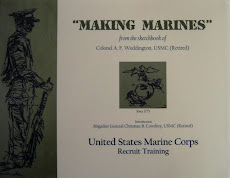by Andy Weddington
Monday, 09 November 2015
"There are three side effects of acid: enhanced long-term memory; decreased short-term memory; and I forget the third." Timothy Leary
Here it is eve of the U. S. Marine Corps birthday and commentary title is about an American not a Marine.
But...
Not until this morning did I learn George's middle name Armitage.
Middle name aside, it will surprise me, greatly, if anyone reading knows or knows of George Armitage Miller and his important work.
I first learned of George Miller nearly 40 years ago. At the time he was 57 and a giant in his chosen profession. And I was a college junior sitting through another lecture on cognitive psychology delivered by Dr. Reed Hunt. His lecture was on memory - short-term memory.
George Miller was a cognitive psychologist. In fact he was a founder of the field and among other notable work wrote an enduring paper titled 'The Magical Number Seven, Plus or Minus Two' - addressing human short-term memory capacity. That is, chunks of data between 5 and 9 (variables of whatever) conducive for short-term retention with 7 being optimal. Or, magical.
His doctoral thesis, about the optimal design for jamming communication signals, was classified Top Secret by the Army. So, though George Miller was not a Marine nor soldier, his work surely indirectly benefited Marines and soldiers fighting during World War II.
Why is Miller's work important? Because.
Why did I remember him from a lecture some 40 years ago? I have no idea. But that's a good question for long-term memory scientists.
And why should you care? Because.
Here's the "but..." part of the title and commentary...
Last week I sat with an old Marine. He talked. I listened. He reminisced about Gavutu and Peleliu and Tarawa and Guadalcanal. He remembered things about being in battle as if they happened yesterday. He told of a dime in his front pocket being hit by a bullet - preventing wound. He still has the creased dime. I don't know how much he retains anymore in short-term memory but there is nothing wrong with his long-term memory.
I didn't ask but suspect he's never heard of George Miller.
When we shifted to conversation about recruit training he remembered, without pause, the names of his drill instructors - "Corporal Newland and Corporal Essen." He remembered, too, the name of his company commander, "Major Wright, oh he was a good one."
And he remembered his rifle serial number, "1032193 - I'll never forget it."
Count the digits.
Seven.
George Miller came to mind.
Seven digits committed to short-term memory in 1939, and retained as a number since in long-term memory.
Remarkable. And some of us can't recall what our wife said seven minutes ago. Not guilty.
The names of my OCS platoon sergeant and sergeant instructor unforgettable. Rifle serial number? Can't recall.
Though I do remember our home telephone number from my youth: 228-7077.
Count the digits.
Seven.
Yet I cannot recall any of the dozen or more telephone numbers since.
Why do I remember George Miller?
Maybe for six letters each word. Maybe because his hypothesis makes good sense. Maybe because Dr. Hunt was a superb teacher. Maybe because, as my wife says, I've a knack for retaining most anything trivial, meaningless, and useless.
I do not know.
What I do know is tomorrow marks our Corps 240th birthday.
Marines!
Count the letters
Seven.
Oh, that old Marine and George Miller? Peers.
Mr. Miller died three years ago at age 92. Thank you, George Armitage Miller - Rest In Peace. Your name and work survives.
The Marine marches on. I'll visit again tomorrow to say "Happy Birthday, Marine!" - his 76th - and listen to whatever he wants to talk about. Some of which I hope to remember.
Semper Fi.










No comments:
Post a Comment